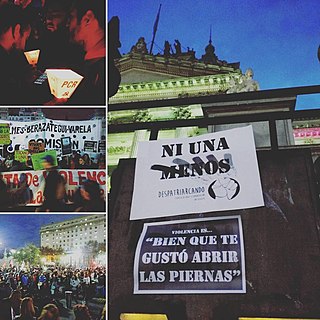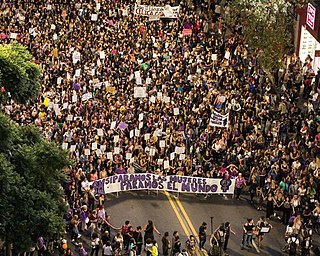
The 1984–1985 United Kingdom miners' strike was a major industrial action within the British coal industry in an attempt to prevent closures of pits that the government deemed "uneconomic" in the coal industry, which had been nationalised in 1947. It was led by Arthur Scargill of the National Union of Mineworkers (NUM) against the National Coal Board (NCB), a government agency. Opposition to the strike was led by the Conservative government of Prime Minister Margaret Thatcher, who wanted to reduce the power of the trade unions.

International Women's Day (IWD) is a holiday celebrated annually on March 8 as a focal point in the women's rights movement. IWD gives focus to issues such as gender equality, reproductive rights, and violence and abuse against women. Spurred by the universal female suffrage movement, IWD originated from labor movements in North America and Europe during the early 20th century.

The General Confederation of Labour is a Spanish trade union federation. Formed as a faction of the National Confederation of Labour (CNT) during the Spanish transition to democracy, its support for participation in union elections led it to split from the organisation, which prohibited participation. After losing a lengthy legal battle for the name, the pro-electoral faction renamed itself to the CGT and reorganised itself as an independent trade union center.
Marxist feminism is a philosophical variant of feminism that incorporates and extends Marxist theory. Marxist feminism analyzes the ways in which women are exploited through capitalism and the individual ownership of private property. According to Marxist feminists, women's liberation can only be achieved by dismantling the capitalist systems in which they contend much of women's labor is uncompensated. Marxist feminists extend traditional Marxist analysis by applying it to unpaid domestic labor and sex relations.

Selma James is an American writer, and feminist and social activist who is co-author of the women's movement book The Power of Women and the Subversion of the Community, co-founder of the International Wages for Housework Campaign, and coordinator of the Global Women's Strike.

Virginia Bolten (1870–1960) was an Argentine journalist and anarchist feminist activist. An anarchist agitator from an early age, she became a leading figure among the working women of Rosario, organising for the Argentine Regional Workers' Federation (FORA) and leading the first women's strike in the country's history. After being recruited into the anarchist movement in Buenos Aires by the Italian anarchist Pietro Gori, she joined some of the country's first anarchist women's organisations and established one of the world's first anarchist feminist periodicals: La Voz de la Mujer.

The International Wages for Housework Campaign (IWFHC) is a grassroots women's network campaigning for recognition and payment for all caring work, in the home and outside. It was started in 1972 by Mariarosa Dalla Costa, Silvia Federici, Brigitte Galtier, and Selma James who first put forward the demand for wages for housework. At the third National Women's Liberation Conference in Manchester, England, the IWFHC states that they begin with those with least power internationally – unwaged workers in the home (mothers, housewives, domestic workers denied pay), and unwaged subsistence farmers and workers on the land and in the community. They consider the demand for wages for unwaged caring work to be also a perspective and a way of organizing from the bottom up, of autonomous sectors working together to end the power relations among them.
Feminist views on transgender topics vary widely.

The status of women in Spain has evolved from the country's earliest history, culture, and social norms. Throughout the late 20th century, Spain has undergone a transition from Francoist Spain (1939-1975), during which women's rights were severely restricted, to a democratic society where gender equality is a fundamental principle. As such, during the past decades the position of women in Spanish society has greatly improved. Women in the broader Spanish population outnumber men by 900,000, totaling an estimated group of 24 million. Until the establishing of separation of church and state in 1978, the Catholic Church in Spain has played a major role with regard to official views on women's role in society.
Feminism in Argentina is a set of movements aimed at defining, establishing, and defending equal political, economic, and social rights and equal opportunities for women in Argentina. Although some women have been considered precursors—among them Juana Manso and Juana Manuela Gorriti—feminism was introduced to the country as a result of the great European immigration wave that took place in the late 19th and early 20th century. The first feminists did not form a unified movement, but included anarchist and socialist activists, who incorporated women's issues into their revolutionary program, and prestigious freethinker women, who initially fought for access to higher education and, later, legal equality with men. The early 20th century was also full of women fighting for their freedom and rights in the workplace. Despite the efforts of the first-wave feminists, Argentine women did not acquire the right to vote until 1947, during Juan Perón's first government. His highly popular wife, Eva, championed women's suffrage and founded and ran the nation's first large-scale female political party, the Female Peronist Party. Although she refused to identify herself as a feminist, Eva Perón is valued for having redefined the role of women in politics.

Ni una menos is a Latin American fourth-wave grassroots feminist movement, which started in Argentina and has spread across several Latin American countries, that campaigns against gender-based violence. This mass mobilization comes as a response to various systemic issues that proliferate violence against women. In its official website, Ni una menos defines itself as a "collective scream against machista violence." The campaign was started by a collective of Argentine female artists, journalists and academics, and has grown into "a continental alliance of feminist forces". Social media was an essential factor in the propagation of the Ni Una Menos movement to other countries and regions. The movement regularly holds protests against femicides, but has also touched on topics such as gender roles, sexual harassment, gender pay gap, sexual objectification, legality of abortion, sex workers' rights and transgender rights.
Fourth-wave feminism is a feminist movement that began around the early 2010s and is characterized by a focus on the empowerment of women, the use of internet tools, and intersectionality. The fourth wave seeks greater gender equality by focusing on gendered norms and the marginalization of women in society.
On 24 October 1975, Icelandic women went on strike for the day to "demonstrate the indispensable work of women for Iceland’s economy and society" and to "protest wage discrepancy and unfair employment practices". It was publicized domestically as Women's Day Off. Participants, led by women's organizations, did not go to their paid jobs and did not do any housework or child-rearing for the whole day. Ninety percent of Iceland's female population participated in the strike. Iceland's parliament passed a law guaranteeing equal rights to women and men the following year.

Women in Iceland generally enjoy good gender equality. As of 2018, 88% of working-age women were employed, 65% of students attending university were female, and 41% of members of parliament were women. Nevertheless, women still earn about 14% less than men, though these statistics do not take into account the hours worked, over-time, and choices of employment. Iceland has the world's highest proportion of women in the labour market and significant child care allocations for working women. It has gender neutral parental leave, with a quota for each parent, and a transferable part.

The International Women's Strike, also known as Paro Internacional de Mujeres, is a global movement coordinated across over 50 countries on International Women's Day, that started in 2017 and 2018. The United Nations announced the theme of "Women in the Changing World of Work: Planet 50-50 by 2030", calling for gender equality around the globe. In the United States, the strike was branded as "Day Without a Woman".
The following lists events that happened in Argentina in 2018.
Events in the year 2018 in Spain.

The International Women's Strike or International Feminist Strike 8-M was a movement that took place on March 8, 2018, International Women's Day. It was organized by feminist movements in support of women's rights across the world. It was supported by over 170 countries and a large number of related local activities.

On the afternoon of 25 September 2021, a group of anonymous feminists intervened in the Christopher Columbus roundabout on Paseo de la Reforma Avenue, Mexico City. On an empty plinth surrounded by protective fences, they installed a wooden antimonumenta, a guerrilla sculpture that calls for justice for the recurrent acts of violence against women in Mexico. It was originally called Antimonumenta Vivas Nos Queremos, subsequently known as Justicia, and depicts a purple woman holding her left arm raised and the word justice carved into a support on the back. Additionally, the Columbus roundabout was also symbolically renamed the Glorieta de las mujeres que luchan.












